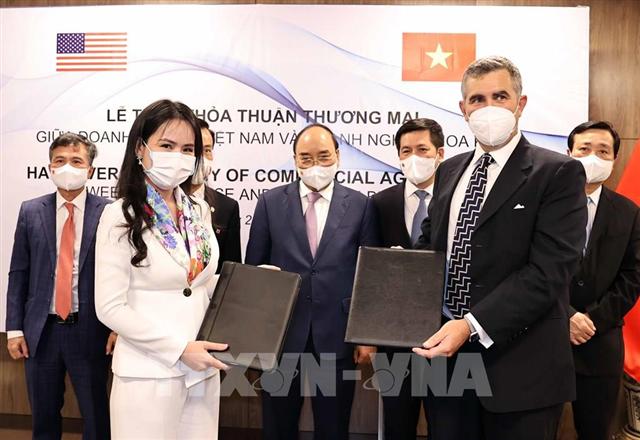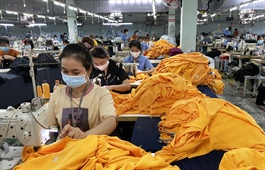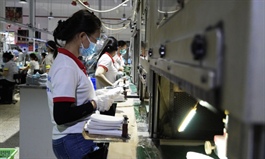Vietnam, US firm sign US$2.5 billion deal on renewable energy
Vietnam, US firm sign US$2.5 billion deal on renewable energy
The deal enables the companies to be in line with Vietnam’s efforts to increase renewable capacity for sustainable development.
Hanoi-based T&T Group and Colorado-headquartered UPC Renewables have signed a memorandum of understanding (MoU) on developing renewable energy in Vietnam on the occasion of the ongoing visit to the US paid by Vietnamese President Nguyen Xuan Phuc.

Representatives of T&T Group and UPC Renewables at a contract-signing ceremony on Sept 21 (New York time) in the attendance of Vietnamese President Nguyen Xuan Phuc. Photo: Thong Nhat/ VNA
|
The deal enables the two firms to invest approximately US$2.5 billion in solar, onshore, and nearshore wind farms with a total capacity of 1.5 gigawatts (GW) in the provinces of Ninh Thuan, Dak Nong, Ben Tre, and Bac Lieu.
UPC-formed companies are now operating wind and solar projects globally with a total capacity of 3.5 GW and an investment of over $5 billion. In the Asia-Pacific region, UPC has an additional development pipeline of more than 5 GW comprising 50 renewable projects.
T&T Group is expected to supply 18.4 GW of gas-to-power electricity and renewable energy to the national grid by 2025, the company said on its website.
The cooperation between T&T Group and UPC Renewables will enable them to go further in Vietnam’s power industry that is poised for the development of renewables in the next decades and more.
During the Vietnamese president’s visit, T&T also signed two deals on agriculture worth a combined of $525 million with The DeLong Co., Inc. and Valero, corn growers and corn-fermented ethanol producers in the US.
With the contracts, T&T will import materials for animal feed production. It plans to import 1.25 million tons in 2022.
In the one-week tour earlier this month to Europe by Chairman of Vietnam’s National Assembly Vuong Dinh Hue, T&T Group signed an MoU to launch a strategic collaboration on developing offshore wind in Vietnam’s Binh Thuan and Ninh Thuan provinces.
It also inked some contracts with European partners to import RT-PCR test kids, vaccine, and tech transfer of vaccine production.
Non-hydro renewable sources such as wind and solar made up 5% of Vietnam’s electricity generation in 2020. Expanding non-hydro renewable capacity will likely help Vietnam rely less on coal, reduce carbon emissions, and increase electricity generating capacity to meet the country’s growing electricity needs.
Vietnam had 16.5 GW solar power and 11.8 GW wind power. A further 6.6 GW is expected to be delivered by the end of 2021. The government is also planning to install 12 GW onshore and offshore wind by 2025.























